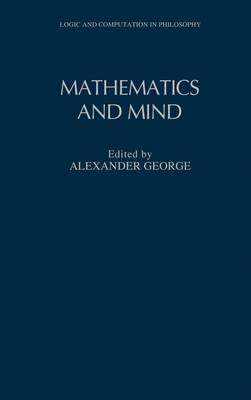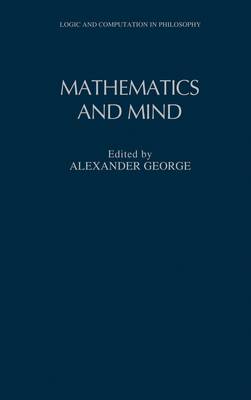
Bedankt voor het vertrouwen het afgelopen jaar! Om jou te bedanken bieden we GRATIS verzending (in België) aan op alles gedurende de hele maand januari.
- Afhalen na 1 uur in een winkel met voorraad
- In januari gratis thuislevering in België
- Ruim aanbod met 7 miljoen producten
Bedankt voor het vertrouwen het afgelopen jaar! Om jou te bedanken bieden we GRATIS verzending (in België) aan op alles gedurende de hele maand januari.
- Afhalen na 1 uur in een winkel met voorraad
- In januari gratis thuislevering in België
- Ruim aanbod met 7 miljoen producten
Zoeken
Omschrijving
Those inquiring into the nature of mind have long been interested in the foundations of mathematics, and conversely this branch of knowledge is distinctive in that our access to it is purely through thought. A better understanding of mathematical thought should clarify the conceptual foundations of mathematics, and a deeper grasp of the latter should in turn illuminate the powers of mind through which mathematics is made available to us. The link between conceptions of mind and of mathematics has been a central theme running through the great competing philosophies of mathematics of the twentieth century, though each has refashioned the connection and its import in distinctive ways. The present collection will be of interest to students of both mathematics and of mind. Contents include: "Introduction" by Alexander George; "What is Mathematics About?" by Michael Dummett; "The Advantages of Honest Toil over Theft" by George Boolos; "The Law of Excluded Middle and the Axiom of Choice" by W.W. Tait; "Mechanical Procedures and Mathematical Experience" by Wilfried Sieg; "Mathematical Intuition and Objectivity" by Daniel Isaacson; "Intuition and Number" by Charles Parsons; and "Hilbert's Axiomatic Method and the Laws of Thought" by Michael Hallett.
Specificaties
Betrokkenen
- Uitgeverij:
Inhoud
- Aantal bladzijden:
- 216
- Taal:
- Engels
- Reeks:
Eigenschappen
- Productcode (EAN):
- 9780195079296
- Verschijningsdatum:
- 8/09/1994
- Uitvoering:
- Hardcover
- Formaat:
- Genaaid
- Afmetingen:
- 161 mm x 243 mm
- Gewicht:
- 512 g

Alleen bij Standaard Boekhandel
+ 746 punten op je klantenkaart van Standaard Boekhandel
Beoordelingen
We publiceren alleen reviews die voldoen aan de voorwaarden voor reviews. Bekijk onze voorwaarden voor reviews.








